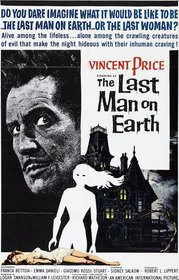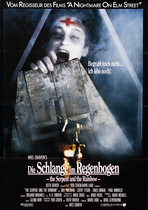Our editor-in-chief Nate Yapp is proud to have contributed to the new book Hidden Horror: A Celebration of 101 Underrated and Overlooked Fright Flicks, edited by Aaron Christensen. Another contributors include Anthony Timpone, B.J. Colangelo, Dave Alexander, Classic-Horror.com's own Robert C. Ring and John W. Bowen. Pick up a copy today from Amazon.com!
The Last Man on Earth (1964)
The Last Man on Earth is the first cinematic adaptation of Richard Matheson's classic novel I Am Legend. With its unique premise and intelligent deconstruction of the vampire myth, Matheson's book brought something fresh and exciting to the horror genre (Stephen King, Steve Niles and George Romero, amongst many others, have cited it as a big inspiration on them). But how well does this film version compare to the novel that inspired it? The answer, unfortunately, is not very.
The film stars genre icon Vincent Price as scientist Robert Morgan, the seemingly sole survivor of a plague that has turned most of the world into vampires. At night they emerge to lay siege to Morgan in his boarded up home, which he has reinforced with crosses, mirrors and garlic to keep them at bay. He moves around by day repairing the damage to his house, searching for supplies in the city and killing whatever vampires he comes across. By the time we meet Morgan in the story he's been alone for three years and comes across as thoroughly jaded with his lonely, monotonous existence. He's surviving just to survive, and he may as well be one of the living dead himself. But when he encounters another survivor, she gives him the first ray of hope he's had in a long time. But is she all she seems?
While The Last Man on Earth is pretty faithful to the book with some minor deviations (Robert Neville becomes Robert Morgan for example), something has been lost in translation. Adapting any book to the big screen is a tricky proposition but since I Am Legend is such an inherently cinematic book it's a real shame that the execution here is so damn lackluster. And in this case the faithfulness to the book only serves to highlight what a missed opportunity the film really is.
For example, one of the most memorable sequences in the book is when Neville is trapped outside after dark and must race home before the vampires come out. In the book, it's a terrifying sequence, starting from the moment Neville realizes his watch is broken and continuing all the way through his frantic race home as he must plow through a horde of pursing vampires. Anyone who's read the book will remember this scene as one of its highlights. But in the film it's a clumsy, plodding action scene with little urgency. Watching Vincent Price dodge some slow moving extras does not make for a heart racing sequence.
And again in the book the relationship Neville has with the stray dog is one of the most emotionally involving passages but in the film events are condensed to the point where it has little impact. If it had been cut entirely it would make no difference to the narrative. And finally the ending of the film lacks the gut punch of the books finale. Neville discovers something shocking about the vampires and without dipping into spoilers this leads to a surprise ending where the reader find out how coldly ironic the title I Am Legend is. But since this line and its meaning have been stripped out, it robs the film of a lot of dramatic weight in its final moments.
Given that a film about the last man alive obviously lives or dies based on its central performance, the casting of Vincent Price is both a help and a hindrance. In the scenes where Price is alone the combination of his trademark voice and haunted eyes really help sell Morgan's isolation and loneliness. He is particularly effective in a scene where Morgan watches a home movie. One moment he's laughing hysterically before bursting into tears the next, and Price nails that broken quality. But on the flipside when it comes to scenes portraying him as a family man with a wife and daughter it's a little harder to buy. He can come across as unintentionally sinister instead of loving and concerned. Price is never less than a captivating screen presence but he feels out of place in such an ordinary role.
And seeing as Price's voice was one of his greatest assets it surprising to note that the film's reliance on voice over becomes so grating. It feels the need to explain EVERYTHING that we see Morgan doing. If we see him in a mirror store, looking at mirrors and then taking some with him, we can safely assume he's replacing the broken mirrors outside his home without needing it explained. Voice over can be an effective tool and it's hardly a chore listening to Vincent Price talk but when it's so on the nose it can become very irritating.
Clunky exposition as a whole is a problem with the film. Whereas the novel wove the flashback segments seamlessly into the narrative the film has one long bloated flashback sequence dumped right into the middle. It presents the information in the bluntest way possible (the origins of the plague, the death of his family, his relationship with his best friend etc) whilst failing to capture the emotional impact it needs to have to make it work. It should be a tragic window into the end of the world, not a bulletpoint summary of exposition.
Also not helping matters is the low budget. There is precious little flair to the cinematography, set design or camera work. But one accidental benefit of this flat style is that it heightens our feeling of Morgan's joyless existence, making it feel even more drab and oppressive. The film also suffers from some sloppy editing and continuity. Morgan's choice of car can change between shots and during the sequence where he must rush back to his house at night there is a shot of him driving where it's clearly daytime, immediately robbing the scene of tension.
The vampires themselves don't prove to be much of a threat, consisting mainly of nondescript extras slapping the walls outside Morgan's house (That said looking at these night time sieges it's easy to see where George Romero got the seeds of Night of the Living Dead). And likewise where there should be a large gang of vampires surrounding the house it feels like there are never more than 10 at any given time. But the film does inspire the occasional spine tingling moment. The creepiest scene by far is when Morgan's wife comes back from the dead and the combination of her whispered voice, the rattling doorknob and the slowly building music make it a real hair-raising scene. The film as a whole could have benefitted from some more suspenseful sequences such as this.
While it might be the most faithful adaptation (later versions The Omega Man and the Will Smith vehicle I Am Legend more or less ignore the story entirely), ultimately The Last Man on Earth stands as a missed opportunity to bring a classic novel to life. Although it's not without its merits the combination of a low budget and sloppy storytelling make for an unsatisfying experience. If you're a fan of the book or Vincent Price give it a look, but I can't say it comes highly recommended.









A fairly concise and
A fairly concise and in-depth analysis of the filmmaking and storytelling, I agree.
I have completed the re-edit of this film to update the narrative using current world views. I don't do camp & I don't use inside jokes... it's a to-the-point adaptation.
That's where this review of the 1964 b&w rings true. The 'filmmaking' has many flaws. I would also include the overall pacing of the grand finale chase and murder scene. The anti-climax is lifeless. I do applaud it for the cast's acting abilities, although I do agree my projection of Vincent Price character-acting persona is not one of '"family guy just like you and me."
The best cinematography is in the dolly moves in & out of lock-down positions that hold on an extended dialogue. It has that stage-play effect. Also include the 'barren city and dead bodies' that make up the minute+ intro scene. The worst are the extended scenes that have no other purpose than to make a longer runtime to qualify as a 'feature' movie, and some sloppy FX. Okay, I'll give them the FX, given the low budget look of the film; it does have its charms.
To compare: I adapted a similar film 'Dementia' aka 'Daughter Of Horror'. It has a voice-over narrator Ed McMahon, underwhelming Foley and a flash back plopped in the middle to give some exposition.
The single most differentiating element to 'Dementia' over 'Last Man On Earth' is in the music. Dementia’s score has its unlikeable parts, but when it get’s it right, it is seamless to the action. I do not get that with ‘Last Man’. It invokes melodrama for no good reason; like a melody that is stretched too long.
We could go on about the quirks and limitations of most of the 1950 thru 1969 sci-fi movies that we all paid money to go see. For me it’s more about myopic cultural views that produced such flawed storytelling. I could also say the same about the mediocre, high budget flops that grace our current theater circuit.
To close, “The Last Man On Earth” did transport me to another world (Italy) and time. Both the first time I saw it and now. The idea of the story was better than the movie itself.
Warm regards, Maki